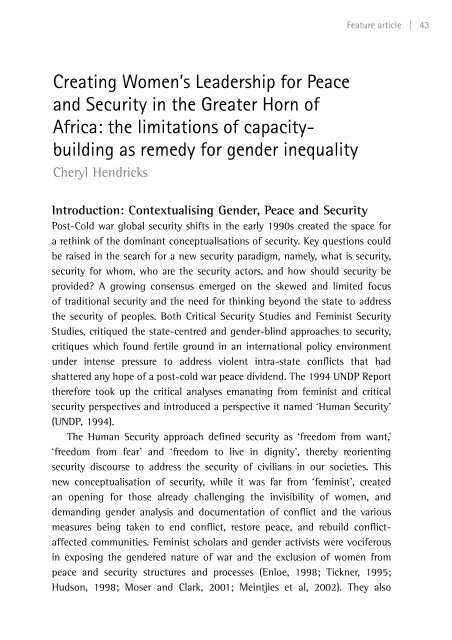You also want an ePaper? Increase the reach of your titles
YUMPU automatically turns print PDFs into web optimized ePapers that Google loves.
Feature article | 43<br />
Creating Women’s Leadership for Peace<br />
<strong>and</strong> Security in the Greater Horn of<br />
Africa: the limitations of capacitybuilding<br />
as remedy for gender inequality<br />
Cheryl Hendricks<br />
Introduction: Contextualising Gender, Peace <strong>and</strong> Security<br />
Post-Cold war global security shifts in the early 1990s created the space for<br />
a rethink of the dominant conceptualisations of security. Key questions could<br />
be raised in the search for a new security paradigm, namely, what is security,<br />
security for whom, who are the security actors, <strong>and</strong> how should security be<br />
provided? A growing consensus emerged on the skewed <strong>and</strong> limited focus<br />
of traditional security <strong>and</strong> the need for thinking beyond the state to address<br />
the security of peoples. Both Critical Security Studies <strong>and</strong> Feminist Security<br />
Studies, critiqued the state-centred <strong>and</strong> gender-blind approaches to security,<br />
critiques which found fertile ground in an international policy environment<br />
under intense pressure to address violent intra-state conflicts that had<br />
shattered any hope of a post-cold war peace dividend. The 1994 UNDP Report<br />
therefore took up the critical analyses emanating from feminist <strong>and</strong> critical<br />
security perspectives <strong>and</strong> introduced a perspective it named ‘Human Security’<br />
(UNDP, 1994).<br />
The Human Security approach defined security as ‘freedom from want,’<br />
‘freedom from fear’ <strong>and</strong> ‘freedom to live in dignity’, thereby reorienting<br />
security discourse to address the security of civilians in our societies. This<br />
new conceptualisation of security, while it was far from ‘feminist’, created<br />
an opening for those already challenging the invisibility of women, <strong>and</strong><br />
dem<strong>and</strong>ing gender analysis <strong>and</strong> documentation of conflict <strong>and</strong> the various<br />
measures being taken to end conflict, restore peace, <strong>and</strong> rebuild conflictaffected<br />
communities. Feminist scholars <strong>and</strong> gender activists were vociferous<br />
in exposing the gendered nature of war <strong>and</strong> the exclusion of women from<br />
peace <strong>and</strong> security structures <strong>and</strong> processes (Enloe, 1998; Tickner, 1995;<br />
Hudson, 1998; Moser <strong>and</strong> Clark, 2001; Meintjies et al, 2002). They also


